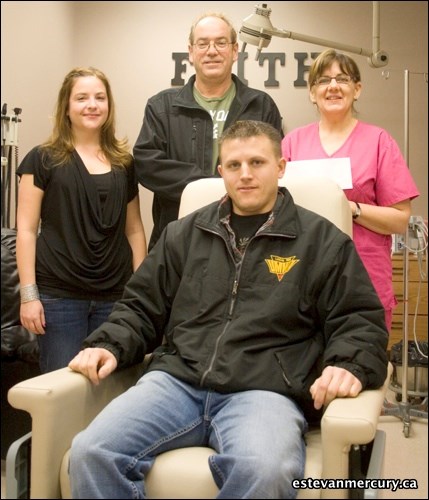A lasting legacy of Penny Dukart's time as a cancer patient at St. Joseph's Hospital will be that patients who undergo chemotherapy treatment in Estevan will do so as comfortably as possible.
Three new chairs were donated in early December to the St. Joseph's Hospital Foundation (SJHF) for cancer patients by United Mine Workers of America (UMWA). Penny's son, Jody Dukart, is the financial secretary for the UMWA Local 7606, and he along with Rick Dowhanuik, UMWA president, donated the three chairs shortly before Penny died on Jan. 1.
When undergoing chemotherapy, patients spend a lot of time in these chairs and while some patients were happy with their accommodations, others like Penny wanted something more.
"They were in need of chairs and Mom was taking treatment," said Dukart. "She was one of the ones complaining the most (about the previous chairs)."
Penny, 53, had breast cancer for six years and underwent treatment in both Estevan and Regina. Dukart said the donation was something they could do to help those who receive care locally.
"It's a good way to support the community. It's good to see they're doing treatments in Estevan now instead of going to Regina," he said.
Dowhanuik added that they just wanted to anything they could to help more people during their treatments. Both men expressed their appreciation that these treatments are available in Estevan and said it's important for them to help support the care here because of how much it affects everyone in the community.
Roxy Blackmore, director for the SJHF, said comfort is very important for cancer patients because often they are scared and being comfortable helps with their stay.
"Penny liked them, and she was a cancer patient. That's what matters," she said. "(Cancer) touches everybody; you can't deny that. Patients spend a lot of time in here, so comfort is key."
The hospital will serve about 400 cancer patients each year who will have access to the new chairs during chemotherapy. At times, some will spend as long as eight hours in the chair for one day of treatment.
The La-Z-Boy chairs that were there will remain, noted Blackmore, because some people prefer those. Now patients have a choice between the two.
The chairs, which cost about $5,000 apiece, have a few added perks over the La-Z-Boys. Most noticeably, the new chairs are mobile. They can be moved anywhere in the hospital and that means less movement for the patient. Blackmore said the last thing people want to do when they are sick is have to move around a lot. Now if they need to be transported to another room, they don't need to be placed on a bed but can remain in the chair.
"The chair also can wheel around, and you can take patients from their room if they're staying at the hospital down to X-ray. They're very easy to manoeuvre. You can very easily and comfortably move the patient."
The chair also reclines into a completely horizontal position and has trays so patients can have books and other personal things always within their reach.
Penny did get an opportunity to use the chairs for a short time during her treatment sessions in December. Dukart said his mother used one of the chairs while she was receiving blood transfusions.
Blackmore noted that Penny did want any donations made in her memory to go to the SJHF for cancer patients.
"She was very forward-thinking; (she was a) very generous lady."



